San Andreas, CA – One of two of the Performing Animal Welfare Society’s (PAWS) most famous big cats undergoes eye surgery for a cancerous tumor.
Falcor, a white Bengal-hybrid tiger, is famous for being one of the 68 big cats seized by the U.S. government from Jeff Lowe, notorious for his role in the Netflix docuseries Tiger King, as detailed in an earlier report here. Recently, Falcor got more attention for his cutting-edge eye surgery. However, this is not the first eye surgery; in 2023, the 11-year-old, 412-pound tiger had a soft tissue sarcoma mass removed from around his left eye that was benign.
 Then in March of this year, staff noticed a mass on his right eye during routine daily care. This May, veterinarians from the University of California-Davis used a new laser treatment called photodynamic therapy to remove a small tumor from his lower eyelid. The surgery was performed right inside his enclosure at the San Andreas animal sanctuary for abused and neglected captive wild animals. The surgery took about 75 minutes, and Falcor remained stable throughout the procedure, and his recovery is going well.
Then in March of this year, staff noticed a mass on his right eye during routine daily care. This May, veterinarians from the University of California-Davis used a new laser treatment called photodynamic therapy to remove a small tumor from his lower eyelid. The surgery was performed right inside his enclosure at the San Andreas animal sanctuary for abused and neglected captive wild animals. The surgery took about 75 minutes, and Falcor remained stable throughout the procedure, and his recovery is going well.
“Since that surgery, we’ve been watching Falcor closely for skin growths. Histopathology confirmed that the most recent mass was a melanoma, a form of skin cancer that has the potential to metastasize throughout the body,” shared PAWS officials, continuing, “We are pleased to report that we removed the mass in its entirety, with good margins around the tumor, but we will remain vigilant as we monitor Falcor for regrowth or additional mass formation.”
Additionally, skin cancer in animals with light-colored coats is at a higher risk due to intentional inbreeding. White tigers are particularly susceptible to health problems due to the genetic defects caused by that process. The practice of inbreeding, which involves generations of individuals carrying a recessive gene for white coloration, can lead to genetic defects such as a cleft palate, crossed eyes, and deformities of the limbs and spinal column.



